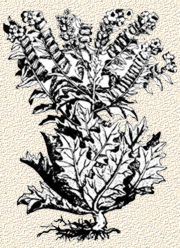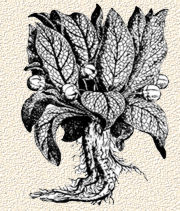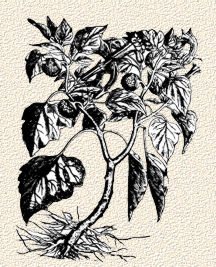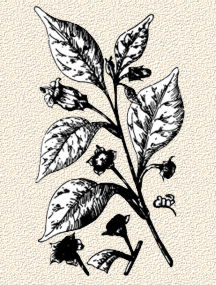The Real ARP
 Cedar: It has occurred to me that many of the readers of this magazine may be concerned by my arrest for possession of drugs last month (see: Staff Reporter Arrested on Drug Charges, July, 1997, vol. 4, Issue#7). As you know, I was not charged, as the type of Indian plant I was transporting was of a strain not rendered illegal in the United States, although it does bear resemblance to A. muscaria, a hallucinogen. The plant is to be part of my ongoing research into human perception and how it interacts with the environment.
Cedar: It has occurred to me that many of the readers of this magazine may be concerned by my arrest for possession of drugs last month (see: Staff Reporter Arrested on Drug Charges, July, 1997, vol. 4, Issue#7). As you know, I was not charged, as the type of Indian plant I was transporting was of a strain not rendered illegal in the United States, although it does bear resemblance to A. muscaria, a hallucinogen. The plant is to be part of my ongoing research into human perception and how it interacts with the environment.
The Alternate Reality Project, or ARP, is an organization dedicated to doing just what I mentioned above. We are ten members strong, wholly independent and self sufficient, and most assuredly a not for profit organization. Currently I am pursuing a Masters degree in Parapsychology at Georg von Podebrad College, and am using what I learn there to supplement my research at the ARP. I regret to say that the location of the ARP's offices can not be disclosed at this time due to the possibility of harassment by law enforcement as I endured recently. I can promise that when conclusive findings are achieved, they will be published. In the meantime, as head of the organization, I am petitioning the Iowa Legislature and all relevant branches of the U.S. Government for the authority to carry on our experiments in a public and open fashion. Alas, I fully expect them to ignore my request at best, and send the FBI to arrest me at worst. But the risk is worth taking if the work we do can further expand humanity's conception of what "reality" is.
It may seem, from what I've said so far , that we are all just a bunch of junkies using this organization to sit around and get high. Nothing is further from the truth. And although mind-altering drugs are an important part of our research, they are neither the most important part of our research nor the ends for which we seek. It is our belief (and this is certainly hard to contest) that what we mean by "reality" in the common sense is "what is true in the world". So if I see a tree and claim that it is real, I am in other words saying that it is true that there is a tree. I think most of us would agree that the term "reality" is commonly used like this.
We at the ARP are in the process of redefining the term. Why? The answer has to do with perception. Nietzsche recognized this when he urged individuals to carve their own morality, the right one for them, out of the world. So did our contemporary Robert Anton Wilson, with his theory about "reality tunnels" (Wilson is a very prolific novelist-sociologist-philosopher-psychologist-anarchist who wrote the Illuminatus Series of novels). Werner Heisenberg's Uncertainty Principle has it that an object becomes different just by being observed. Right there is enough of an indication that perception alters reality, and vice versa. And as far as the environment altering perception, consider this: we never perceive the actual environment. That is to say, I don't see the tree, but instead light reflected off the tree is taken in by my eyes, and this stimulates neurons in my brain and thus the object is recognized. Even when we touch something, we are not feeling the object, exactly. We only are really recognizing changes in our body states after the environment has interacted with it. Even that word, "after", has serious implications. Our neural systems may be fast, but it still takes some time for a signal from the exterior of our body to be registered by the central nervous system. Therefore, we always perceive "late".
It should be clearer why the notion of reality is one that cannot, and must not be taken lightly. With all of these problems of perception, the Alternate Reality Project has its work cut out. We have two major goals: 1) to define and delineate what reality is, and, to a lesser extent, 2) to test the limits of human perception of reality.
 In order to accomplish these goals, we still do a lot of philosophizing, but we are all trained researchers as well. In our ranks are men and women who are talented in the skills of psychology, chemistry, botany, neuroanatomy, physics, electronics, parapsychology, medicine and more. Our methods and fields of experimentation are varied and often quite exciting.
In order to accomplish these goals, we still do a lot of philosophizing, but we are all trained researchers as well. In our ranks are men and women who are talented in the skills of psychology, chemistry, botany, neuroanatomy, physics, electronics, parapsychology, medicine and more. Our methods and fields of experimentation are varied and often quite exciting.
We have run experiments in an isolation tank to see what minimal sensory input does to perception. One experiment we called the Noise Box, in which we created a dynamic and chaotic environment, essentially the reverse of an isolation tank. We have used EEG to explore the realm of hypnogogia, that period between sleep and wakefulness when the mind experiences "waking dreams". We have spoken with individuals who feel they've achieved enlightenment through meditation, and many of us are attempting to do the same. And we have even attempted out of body travel (a.k.a. astral projection), with only one sign of possible success so far.
 The list goes on. But I would be remiss to ignore our experiments involving various drugs and compounds. Our chemistry and biology experts are working hard to determine how certain drugs, especially hallucinogens and deleriants, work on the human mind. Especially of interest to us are the rarest drugs, like the A. muscaria derivative. This is because we can legally transport and perform experiments with these substances without fear of imprisonment. But I will admit that we have run and will continue to run experiments with known controlled substances in the name of Science. These include, but are by no means limited to: tetrahydrocannabinol (marinol), psilocybin, mescaline, phencyclidine (PCP), fentanyl (an opiate), the xanthenes (caffeine, theophylline [tea], theobromine [chocolate]), scopolamine and atropine (found in belladonna and mandrake), laudanum, etc. The list is wide and varies, as we tend to leave nothing out in the quest to find the limits to the human perception of reality.
The list goes on. But I would be remiss to ignore our experiments involving various drugs and compounds. Our chemistry and biology experts are working hard to determine how certain drugs, especially hallucinogens and deleriants, work on the human mind. Especially of interest to us are the rarest drugs, like the A. muscaria derivative. This is because we can legally transport and perform experiments with these substances without fear of imprisonment. But I will admit that we have run and will continue to run experiments with known controlled substances in the name of Science. These include, but are by no means limited to: tetrahydrocannabinol (marinol), psilocybin, mescaline, phencyclidine (PCP), fentanyl (an opiate), the xanthenes (caffeine, theophylline [tea], theobromine [chocolate]), scopolamine and atropine (found in belladonna and mandrake), laudanum, etc. The list is wide and varies, as we tend to leave nothing out in the quest to find the limits to the human perception of reality.
 One might say, I suppose that the use of drugs makes an individual's perception of reality wrong, and therefore they deceive when one tries to experience reality. We heartily disagree. We say that perception of reality is different, not wrong. The American Medical Association still has a difficult time effectively proving to schizophrenes that they are wrong in regard to their perception of reality. They inhabit a different reality tunnel, so to speak. Native Americans (who can legally use peyote on reservations for religious purposes) and people from other cultures who use drugs to come closer to a religious or holy state, say that the effect the drugs have on them is similar to both hypnogogia and a period of enlightenment experienced by monks from both Eastern and Western religions. What is wrong perception of reality, and what is merely different? And what, if any, form of perception, can we say is "right"?
One might say, I suppose that the use of drugs makes an individual's perception of reality wrong, and therefore they deceive when one tries to experience reality. We heartily disagree. We say that perception of reality is different, not wrong. The American Medical Association still has a difficult time effectively proving to schizophrenes that they are wrong in regard to their perception of reality. They inhabit a different reality tunnel, so to speak. Native Americans (who can legally use peyote on reservations for religious purposes) and people from other cultures who use drugs to come closer to a religious or holy state, say that the effect the drugs have on them is similar to both hypnogogia and a period of enlightenment experienced by monks from both Eastern and Western religions. What is wrong perception of reality, and what is merely different? And what, if any, form of perception, can we say is "right"?
The ARP is working diligently to answer these questions. It is my own personal belief that we will eventually unlock some secrets of the paranormal along the way, perhaps rendering astral travel, telepathy, bilocation and ESP natural and understandable.
Back to this Issue Contents
